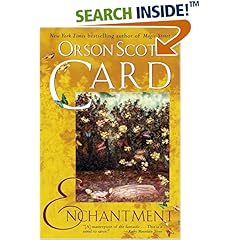
I just finished reading
Peter Pan in Scarlet, the authorized sequel to J.M. Barrie's
Peter Pan. I recently read
Peter Pan for the first time and wasn't overly impressed with the story. It's much darker than the Disney tale of it, which they often seem to be. Therefore I have no real objections to the story --- I just didn't care for the original version. I feel no qualms about saying that I do not like the sequel.
First, I would like to say that I think McCaughrean did an EXCELLENT job of following Barrie's style of writing. It read and felt the same to me. That is no small feat to accomplish and hats off to McCaughrean for trying and, in my opinion, succeeding! She used the same short, choppy sentences. She played with words and phrases in the same manner. It was quite obvious that she made herself very familiar with Barrie's original work.
There are several themes which run throughout this book which I found annoying at best and distressing at worst. I probably didn't like it on the whole because I really don't care for the character of Peter to begin with. McCaughrean kept him just as self-centered and bratty as Barrie made him out to be in the first place. The worst offense one can give in this life, according to Peter, is to grow up, etc., etc..
This book tells the story of how the lost boys grew up and return with Wendy once again to Neverland where children were previously known never to have grown up. (Turns out you CAN grow up under certain circumstances.) I don't want to spoil the end for those of you who have not read it so I'm not going to focus too much on the plot. I'd rather discuss some of the side themes that I found disturbing.
For starters, Tootles becomes a girl in order to return to Neverland. Clothes, in this book, make the man (or, as the case may be, the little boy or girl). Since adults cannot return to Neverland, the Lost Boys had to borrow clothes from their children in order to be re-accepted into this fairy world. Tootles, having only daughters, wore girl clothes and reentered Neverland in female form. Peter apparently doesn't even notice that Tootles is now a girl. This just struck me as an "acceptance" argument for the changing of sexes. A tiny "reasonable" explanation is offered and it is supposed to be cute, understandable and funny as to why Tootles would go from being a man with an austere mustache, to "Princess Tootles" who desires to be a nurse and marry Peter. It's just a disturbing image to add to the story. It seems society would like to creep in wherever possible and gently, subtly, in the form of little children's stories, convince children that it is ok to dress as a member of the opposite sex. It simply is not. God created us to be either male or female. He makes the distinctions. We are made in His glory, in His image and for His honor. I cannot take it lightly when sexes attempt a blend or a change and call it "normal." It is anything BUT normal.
The other thing that bothered me was a minor argument in which McCaughren mentions that some circus animals were caged. She briefly touches on the "animals are people too" argument. I should clearly state that I am definitely in support of the ethical treatment of animals. And it does tug the heartstrings to see animals behind bars at times. But that does not mean that that is necessarily an evil and should never be portrayed as such all across the board. Bars save human lives, plain and simple. Anyway! Minor issue with the book.
The last bone I had to pick with the book was McCaughrean's explanation for the villain's existence. It was a bit graphic. But again, I thought she was very much in keeping with Barrie's original tale so I can't necessarily say her means of disclosure was necessarily uncalled for. To be any less explicit would be less Barrie. And, quite frankly, he was rather vivid. But if you didn't like the way he wrote the story, be prepared not to like McCaughrean. It's rather a Catch-22 of sorts.
On the whole I'd have to say I really did NOT like this story. Despised it, really. I didn't like the modern themes -- and that definitely factors in -- but I also did not like it because it was very much Barrie. And for that reason, I have to say "WELL DONE!"
McCaughrean did good.
In a way.
 There were a lot of things about this book that perhaps should have made me not like it: the deliberate Christian/Jewish/Pagan syncretism, the use of "good" witchcraft, the disocvery of one's true love after getting engaged to someone else, the verging into areas a little more personal than perhaps should be put into print.
There were a lot of things about this book that perhaps should have made me not like it: the deliberate Christian/Jewish/Pagan syncretism, the use of "good" witchcraft, the disocvery of one's true love after getting engaged to someone else, the verging into areas a little more personal than perhaps should be put into print.

